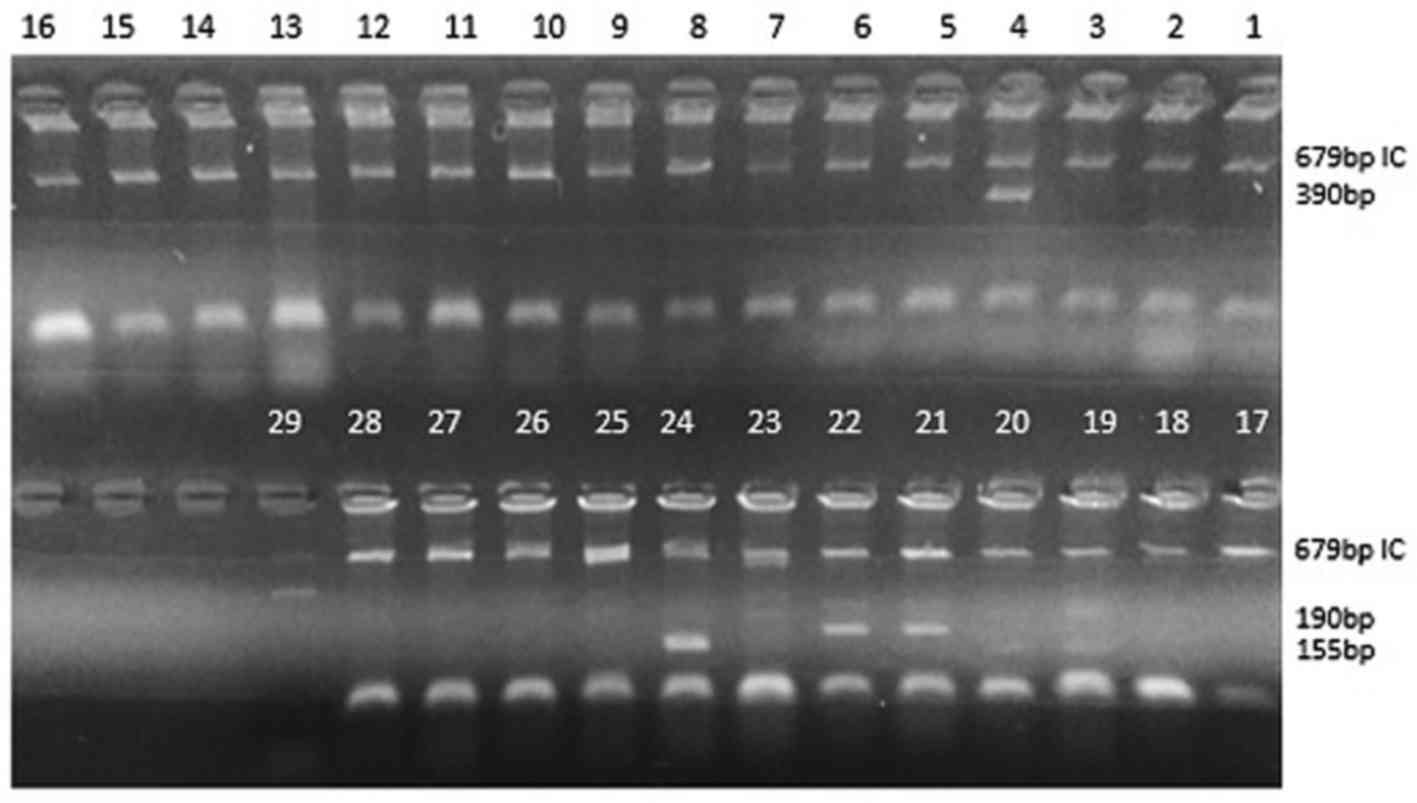|
1
|
Ahsan T, Erum U, Jabeen R and Khowaja D:
Ankylosing Spondylitis: A rheumatology clinic experience. Pak J Med
Sci. 32:365–368. 2016.PubMed/NCBI
|
|
2
|
Hospital TO: The pathogenesis of
ankylosing spondylitis. Neurosurg Focus. 24:1–10. 2008. View Article : Google Scholar
|
|
3
|
Raychaudhuri SP and Deodhar A: The
classification and diagnostic criteria of ankylosing spondylitis. J
Autoimmun 48–49. 1–133. 2014.
|
|
4
|
Reveille JD: Major histocompatibility
genes and ankylosing spondylitis. Best Pract Res Clin Rheumatol.
20:601–609. 2006. View Article : Google Scholar : PubMed/NCBI
|
|
5
|
Brown MA: Breakthroughs in genetic studies
of ankylosing spondylitis. Rheumatology (Oxford). 47:132–137. 2008.
View Article : Google Scholar : PubMed/NCBI
|
|
6
|
Sheehan NJ and Frcp M: The ramifications
of HLA-B27. J R Soc Med. 97:10–14. 2004. View Article : Google Scholar : PubMed/NCBI
|
|
7
|
Reveille JD, Ball EJ and Khan MA: HLA-B27
and genetic predisposing factors in spondyloarthropathies. Curr
Opin Rheumatol. 13:265–272. 2001. View Article : Google Scholar : PubMed/NCBI
|
|
8
|
Khan MA: Polymorphism of HLA-B27: 105
subtypes currently known. Curr Rheumatol Rep. 15:1–6. 2013.
View Article : Google Scholar
|
|
9
|
Tipu HN: Journal of Genetic Disorders and
Genetic Reports Mini Review: HLA B27 and its immunogenetics in
ankylosing spondylitis. J Genet Disor Genet Rep. 2:12013.
|
|
10
|
Khan MA and Khan MK: Diagnostic value of
HLA-B27 testing ankylosing spondylitis and Reiter's syndrome. Ann
Intern Med. 96:70–76. 1982. View Article : Google Scholar : PubMed/NCBI
|
|
11
|
Mou Y, Zhang P, Li Q, Lin Z, Liao Z, Wei Q
and Gu J: Clinical features in Juvenile-Onset ankylosing
spondylitis patients carrying different B27 subtypes. Biomed Res
Int. 2015:5948782015. View Article : Google Scholar : PubMed/NCBI
|
|
12
|
Dunky A, Neumüller J, Hübner C, Fischer
GF, Bayer PM, Wagner E, Schwartz DW and Mayr WR: HLA-B27
determination using serological methods. A comparison of enzyme
immunoassay and a microlymphocytotoxic test with flow cytometry and
a molecular biological assay. Rheumatol Int. 16:95–100. 1996.
View Article : Google Scholar : PubMed/NCBI
|
|
13
|
Skalska U, Kozakiewicz A, Maśliński W and
Jurkowska M: HLA-B27 detection - comparison of genetic
sequence-based method and flow cytometry assay. Reumatologia.
53:74–78. 2015. View Article : Google Scholar : PubMed/NCBI
|
|
14
|
Middelton D: HLA typing from serology to
sequencing Era. Iran J Allergy Asthma Immunol. 4:53–66.
2005.PubMed/NCBI
|
|
15
|
Seipp MT, Erali M, Wies RL and Wittwer C:
HLA-B27 typing: Evaluation of an allele-specific PCR melting assay
and two flow cytometric antigen assays. Cytometry B Clin Cytom.
63:10–15. 2005. View Article : Google Scholar : PubMed/NCBI
|
|
16
|
Cianga P, Zlei M, Rezus E and Cianga C:
The flow cytometric labeling pattern in HLA-B27 detection may
suggest cross reactivities. Rev Romana Med Lab. 19:185–191.
2011.
|
|
17
|
Chatterjee A, Sinha SK and Mukherjee G: A
comprehensive review on HLA and its detections by polymerase chain
reaction technique. Int J Pharm Res Sch. 3:340–346. 2014.
|
|
18
|
Shyamala V and Ferro-Luzzi Ames G: Single
specific primer-polymerase chain reaction (SSP-PCR) and genome
walking. Methods Mol Biol. 15:339–348. 1993.PubMed/NCBI
|
|
19
|
Downing J, Coates E, Street J, Hammond L,
Rees TJ, Pepperall J and Darke C: A high-resolution polymerase
chain reaction-sequence-specific primer HLA-B*27 typing set and its
application in routine HLA-B27 testing. Genet Test. 10:98–103.
2006. View Article : Google Scholar : PubMed/NCBI
|
|
20
|
Hücre A, Hla B, Testinin T and Yorumu K:
Accurate and simple interpretation of HLA B27 screening by flow
cytometry. Turk J Immunol. 4:1–6. 2016. View Article : Google Scholar
|
|
21
|
Olerup O and Zetterquist H: HLA-DR typing
by PCR amplification with sequence-specific primers (PCR-SSP) in 2
hours: An alternative to serological DR typing in clinical practice
including donor-recipient matching in cadaveric transplantation.
Tissue Antigens. 39:225–235. 1992. View Article : Google Scholar : PubMed/NCBI
|
|
22
|
Zafar N, Khan S, Qadir A, Raza Y, Naqvi A
and Rizvi A: Hla frequencies in Pakistani population. JPMA.
46:12–13. 1996.
|
|
23
|
Mou Y, Wu Z, Gu J, Liao Z, Lin Z, Wei Q,
Huang J and Li Q: HLA-B27 polymorphism in patients with juvenile
and adult-onset ankylosing spondylitis in Southern China. Tissue
Antigens. 75:56–60. 2010. View Article : Google Scholar : PubMed/NCBI
|
|
24
|
Cheng X, Mei Y, Ji X, Xue Q and Chen D:
Molecular mechanism of the susceptibility difference between
HLA-B*27:02/04/05 and HLA-B*27:06/09 to ankylosing spondylitis:
substitution analysis, MD simulation, QSAR modelling, and in vitro
assay. SAR QSAR Environ Res. 27:409–425. 2016. View Article : Google Scholar : PubMed/NCBI
|
|
25
|
Sharma N, Singh P, Nautiyal SC, Shuaib M,
Rawat P and Kaur G: Rapid detection of HLA-B27 sequence specific
alleles by in-house optimized molecular assay for the detection of
ankylosing spondylitis. J Biomed Pharm Res. 2:175–180. 2013.
|
|
26
|
Yang R, Zhang JH and Yuan GY:
Establishment of an optimized PCR method using sequence-specific
primers for screening multiple gene polymorphisms simultaneously.
Mol Med Rep. 7:201–204. 2013. View Article : Google Scholar : PubMed/NCBI
|
|
27
|
Hardjasa A, Ling M, Ma K and Yu H:
Investigating the effects of DMSO on PCR fidelity using a
restriction digest-based method. J Exp Microbiol Immunol.
14:161–164. 2010.
|
|
28
|
Hung T, Mak K and Fong K: A specificity
enhancer for polymerase chain reaction. Nucleic Acids Res.
18:49531990. View Article : Google Scholar : PubMed/NCBI
|
|
29
|
Ralser M, Querfurth R, Warnatz HJ, Lehrach
H, Yaspo ML and Krobitsch S: An efficient and economic enhancer mix
for PCR. Biochem Biophys Res Commun. 347:747–751. 2006. View Article : Google Scholar : PubMed/NCBI
|















